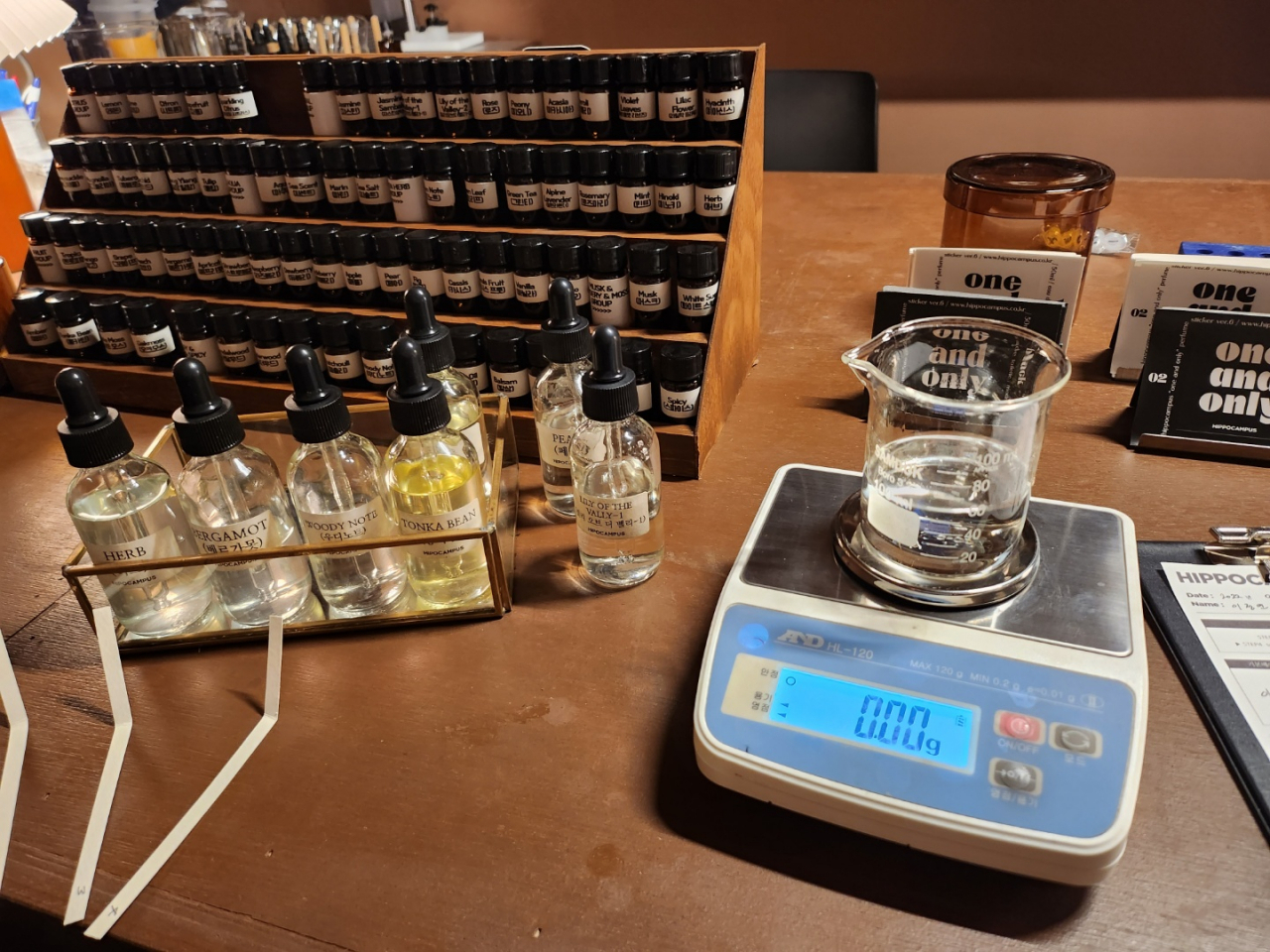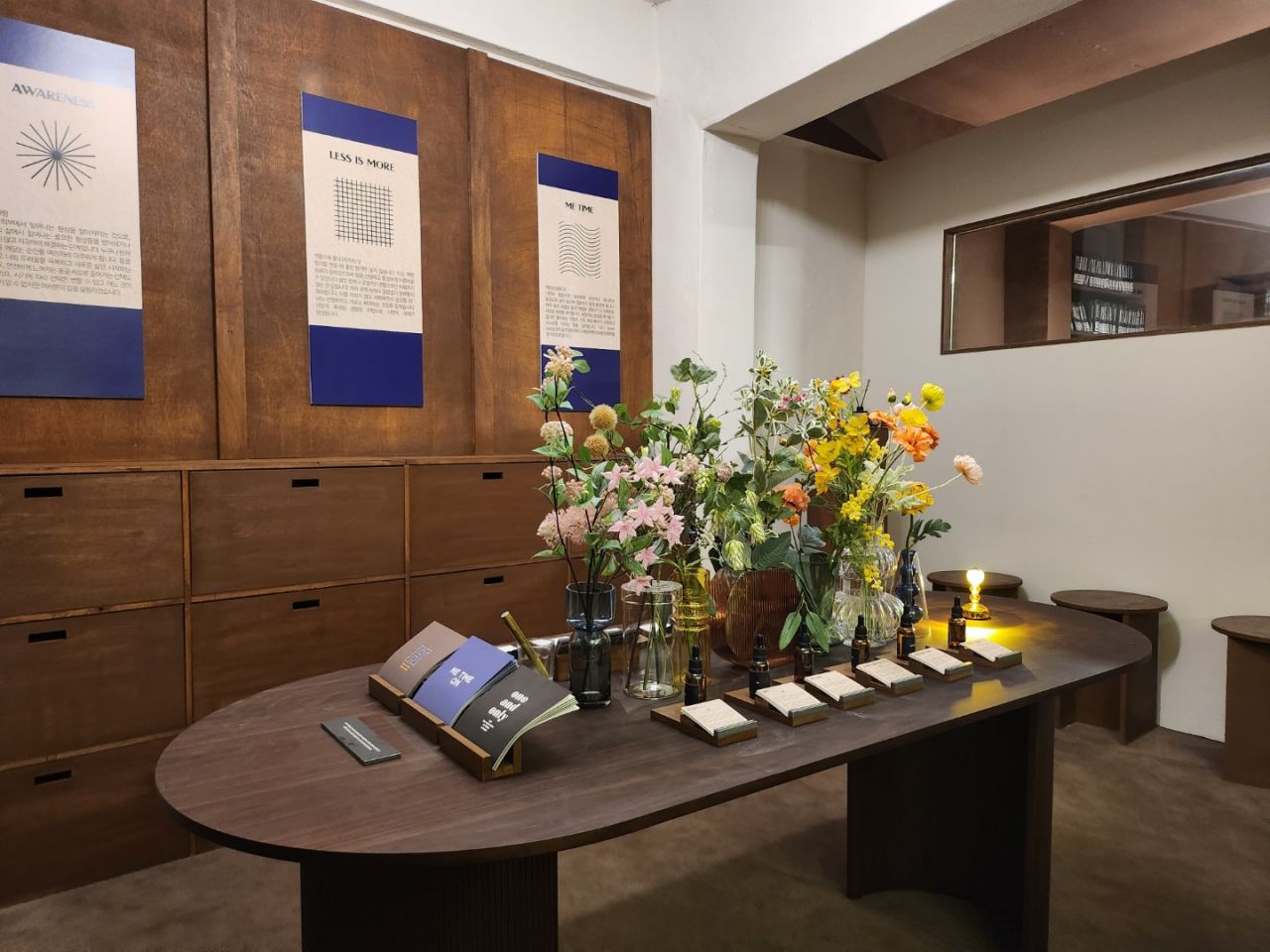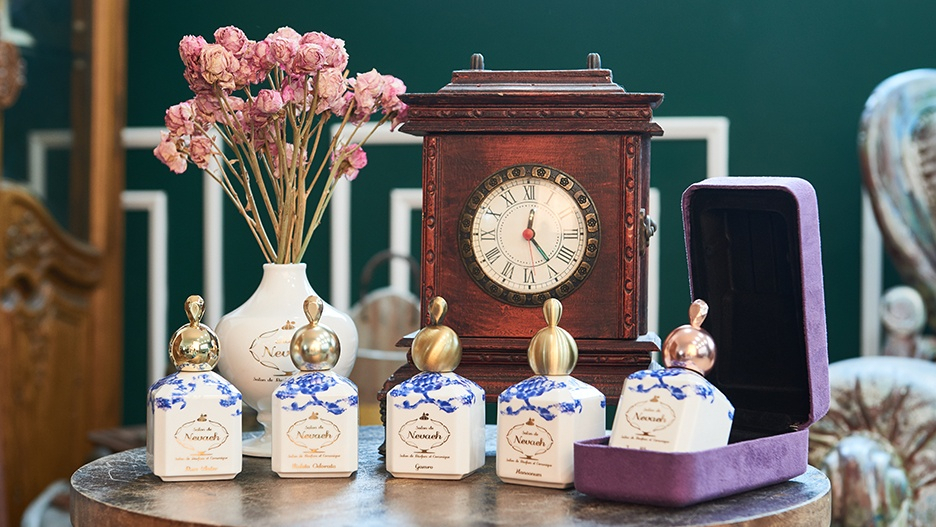 |
Bottles of perfume fragrances are displayed at the perfume workshop room of Hippocampus, located in Seongdong-gu, Seoul, Monday. (Lee Jung-youn/The Korea Herald) |
“Perfume and fragrances are ways I can present myself as I want,” said 24-year-old Lee Seo-hyun, who frequently uses perfume craft workshops to create her own perfumes.
For Lee, perfume is not just a luxury item, but a tool for self-expression.
“I admire people who use perfumes skillfully. It feels like they really have a deep understanding about themselves," she said. Lee says that different perfumes convey different impressions of a person, ranging from tender to professional -- to even intimidating.
"We can decorate ourselves visually with clothes and makeup, but perfumes also have a profound effect on creating your image," she said.
Lee is just one of many Koreans discovering the allure and depth of perfumes. One of the factors behind their rapid rise in popularity is "gongbang," or craft workshop, culture.
Don't just buy, create
Gongbang is a steadily growing part of many industries in South Korea. Craft workshop classes for pottery, leather working and accessory making have sprung up across the country.
Among them, perfume workshops have gained popularity in recent years.
Each perfume workshop has a slightly different process, but the basic goal is the same: to make your own perfume by selecting and blending the fragrances that you like.
 |
A customer measures a fragrance to design her own perfume at a workshop offered by Salon de Nevaeh, a Korean niche perfume brand, located in Jongno-gu, Seoul. (Salon de Nevaeh) |
Under the guidance of a perfumer, customers try smelling 30 to 40 kinds of fragrances from pure ingredients and choose the ones they like. A perfumer will help the customer create a balanced perfume from different fragrances by recommending or eliminating some of them.
Then the customer mixes the fragrances, paying attention to the harmony between their diverse scents, and add an alcohol solution to thin the concentrate. The customer can adjust the amount of liquid according to the strength and duration of the perfume that he or she wants. Eau de toilette -- a light perfume which lasts about three to four hours -- is the most common type of perfume customers choose to make at workshops.
Learning and collecting memories
Lee Ha-eun, a kindergarten teacher in her mid-20s, says that her experiences at perfume workshops have helped her discover new tastes.
“I actually thought I hated perfumes or any products with fragrances, but it turned out that it was a problem of just a few fragrances that I disliked -- not all fragrance products,” she said. By smelling individual fragrances in a workshop, she has learned what kinds she prefers.
Perfume workshops also allow customers to experience the various stages of a perfume properly, Lee added. Perfumes have many layers, which are gradually revealed over time.
"At ordinary stores, I only got to smell the perfume right after I sprayed the product, but at workshops I can stay for nearly an hour and experience every layer of the perfume, which changes over time,” she said.
 |
Fragrances and flowers are displayed in the Hippocampus perfume workshop room, in Seongdong-gu, Seoul, Monday. The serene atmosphere provides a private space for customers to concentrate on their senses. (Lee Jung-youn/The Korea Herald) |
Kim Se-jong, 23, who recently visited a perfume workshop, said even those who know nothing about perfumes need not worry. "The perfumer explained each fragrance by comparing them to the season, atmosphere and temperature, so I was really satisfied with the result," he said.
Some said that the experience of participating in a perfume workshop was more special than the perfume itself. "My first visit to a perfume workshop was with my friend, to make perfumes for each other. I like perfumes, but the workshop experience was more about creating special memories with someone I like,” said 24-year-old Baek Ji-won.
 |
Perfumes are displayed at a Salon de Nevaeh perfume workshop, located in Jongno-gu, Seoul. (Salon de Nevaeh) |
Perfumes and workshops both on rise
Experts said that the two main factors of the industry, perfume products and perfume workshops, effectively targeted current consumers' desire to customize their self-presentation.
Cheon Min-ju, a perfumer and the owner of the perfume workshop Mellow Garden, explained that more and more people are looking for different and unique scents. "When you meet someone who is wearing a similar perfume as yourself, it’s kind of awkward -- as if you’re looking at someone wearing the same clothes as you."
"The perfume industry has shown significant growth in recent years. Even during the COVID-19 pandemic, when most of the beauty industry had been hit by the use of masks, the perfume industry has grown continuously," said Nevaeh, a perfumer and owner of one of the first niche perfume brands in Korea, Salon de Nevaeh.
Although the brand has already successfully entered overseas markets, Nevaeh still runs perfume workshops, saying that they still have considerable popularity. Customers’ ages at the workshops have gradually expanded from those in their 20s to those in their 40s and above.
She expects the demand for perfume workshops and perfumes to keep rising. Her brand has recently expanded its workshop service, launching short classes for VIP customers of major domestic department stores.
“The Korean perfume industry will continue to grow, with the workshop culture alongside it,” she said.







![[Today’s K-pop] Blackpink’s Jennie, Lisa invited to Coachella as solo acts](http://res.heraldm.com/phpwas/restmb_idxmake.php?idx=644&simg=/content/image/2024/11/21/20241121050099_0.jpg)